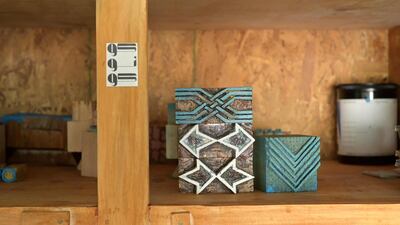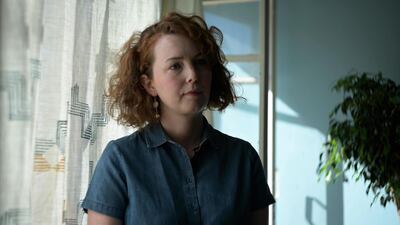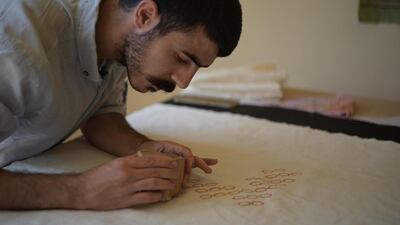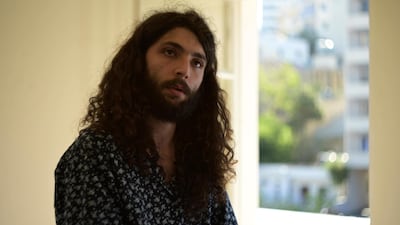Inside a rundown building at the heart of Beirut in Lebanon, young Syrian men are hard at work pounding a piece of white cloth with a hand-crafted stamp dipped in mahogany and deep brown.
They are among the last artisans to master the old Syrian craft of woodblock printing.
“When you come across a block-printed piece, there is something about it in your memory, you feel like you’ve seen it before,” says Ward AlKalaf, 26, a Syrian designer at the recently launched Studio Kunukku.
The project underlines Lebanon’s important role in preserving Syrian heritage, despite the country’s severe economic crisis and the deadly Beirut port explosion.
Many Syrian artists and artisans fled to Lebanon to escape war. Although Beirut is renowned for its vibrant arts scene, Studio Kunukku represents a rare new cultural enterprise at a time of crises.
AlKalaf says the workshop aims to revive these familiar patterns that are etched into Syria’s collective memory, but whose history has not been documented.
“We are trying to build a rescue plan for whatever remains of this craft,” he says.
Once popular across Syria, woodblock prints adorned homeware with intricate floral and animal shapes, as well as geometric motifs.
But 10 years of war and the advent of new technologies drove it to the brink of extinction.
Before arriving in Beirut to study fashion in 2017, AlKalaf, a Damascene, spent years collecting photographs of the traditional motifs adorning buildings in Aleppo, Hama, Homs and the Syrian capital.
These include intricate floral designs but also simple lines and curves that meet in perfect symmetry.
Most were destroyed by war. They are now serving as inspiration for the studio's stamps.
From Cairo to Beirut
The new studio was launched six months ago when Sarah Hayes, an American, quit her United Nations job in Cairo, to move to crisis-hit Beirut where she converted her apartment into a workshop for resuscitating endangered crafts.
There is room to find hope, we just have to create it
Since then, a budding crew of Syrian, Ethiopian and Lebanese artisans have taken up residence at the volunteer-run atelier.
The British Council recently awarded the studio a grant, which the team hopes will be a launchpad for the project to become financially sustainable.
“There is room to find hope, we just have to create it,” Ms Hayes says as she peers out the window at the Mar Mikhael neighbourhood, badly damaged by the Beirut blast.
She came to Beirut in search of Zena Sabbagh, one of the last wardens of Syrian woodblock printing. Sabbagh dedicated her career to keeping woodstamping alive in Syria. After the war, she fled to Beirut where she taught other artisans the tenets of the craft, before moving abroad a few months ago.
'The choices are literally unlimited'
One of Sabbagh's students is Fadi Al Melhem, 25, the main artisan at Studio Kunukku and an old friend of AlKalaf's. A graduate of fine arts from Damascus University, he learnt everything he knows about the craft from Ms Sabbagh in Beirut and has now begun carving his own wooden stamps.
Marking a piece of cloth with a geometric shape of his own design, Al Melhem says his favourite motif is a simple straight line.
Dozens of wooden carvings lay beside him in the atelier, engraved with flowers, semi-circles and geometric shapes.
“The choices are literally unlimited,” he says, beaming with pride. "There are so many motifs to experiment with.”
Al Melhem's dream of becoming a jewellery designer was cut short last August when his prospective employer's shop was destroyed in the port explosion. But since then, he has found a new passion for block printing.
“Instead of expressing myself with words, I can express myself through a certain technique, an artwork,” he says.
Reviving the craft, however, requires a collective effort. The young man points at a large, ornate floral stamp that he carved drawing inspiration from a photograph that AlKalaf brought with him from Syria. The motif is from a Damascene house that no longer exists.
Their work, AlKalaf says, "is a tribute to all these beautiful places that have planted so many memories in my head".
Despite widespread corruption and economic strife in Lebanon, Al Melhem and AlKalaf say Beirut is a place where their dreams could come true.
"It's this fantasy that you're trying to do something of value and that, maybe, it will remain," says AlKalaf.
“I would have never imagined I could create something like this if I was still in Syria.”
Lexus LX700h specs
Engine: 3.4-litre twin-turbo V6 plus supplementary electric motor
Power: 464hp at 5,200rpm
Torque: 790Nm from 2,000-3,600rpm
Transmission: 10-speed auto
Fuel consumption: 11.7L/100km
On sale: Now
Price: From Dh590,000
The biog
Favourite hobby: taking his rescue dog, Sally, for long walks.
Favourite book: anything by Stephen King, although he said the films rarely match the quality of the books
Favourite film: The Shawshank Redemption stands out as his favourite movie, a classic King novella
Favourite music: “I have a wide and varied music taste, so it would be unfair to pick a single song from blues to rock as a favourite"
Real estate tokenisation project
Dubai launched the pilot phase of its real estate tokenisation project last month.
The initiative focuses on converting real estate assets into digital tokens recorded on blockchain technology and helps in streamlining the process of buying, selling and investing, the Dubai Land Department said.
Dubai’s real estate tokenisation market is projected to reach Dh60 billion ($16.33 billion) by 2033, representing 7 per cent of the emirate’s total property transactions, according to the DLD.
GROUP RESULTS
Group A
Results
Ireland beat UAE by 226 runs
West Indies beat Netherlands by 54 runs
Group B
Results
Zimbabwe tied with Scotland
Nepal beat Hong Kong by five wickets
The specs
Engine: 2.0-litre 4cyl turbo
Power: 261hp at 5,500rpm
Torque: 405Nm at 1,750-3,500rpm
Transmission: 9-speed auto
Fuel consumption: 6.9L/100km
On sale: Now
Price: From Dh117,059
Other must-tries
Tomato and walnut salad
A lesson in simple, seasonal eating. Wedges of tomato, chunks of cucumber, thinly sliced red onion, coriander or parsley leaves, and perhaps some fresh dill are drizzled with a crushed walnut and garlic dressing. Do consider yourself warned: if you eat this salad in Georgia during the summer months, the tomatoes will be so ripe and flavourful that every tomato you eat from that day forth will taste lacklustre in comparison.
Badrijani nigvzit
A delicious vegetarian snack or starter. It consists of thinly sliced, fried then cooled aubergine smothered with a thick and creamy walnut sauce and folded or rolled. Take note, even though it seems like you should be able to pick these morsels up with your hands, they’re not as durable as they look. A knife and fork is the way to go.
Pkhali
This healthy little dish (a nice antidote to the khachapuri) is usually made with steamed then chopped cabbage, spinach, beetroot or green beans, combined with walnuts, garlic and herbs to make a vegetable pâté or paste. The mix is then often formed into rounds, chilled in the fridge and topped with pomegranate seeds before being served.
The candidates
Dr Ayham Ammora, scientist and business executive
Ali Azeem, business leader
Tony Booth, professor of education
Lord Browne, former BP chief executive
Dr Mohamed El-Erian, economist
Professor Wyn Evans, astrophysicist
Dr Mark Mann, scientist
Gina MIller, anti-Brexit campaigner
Lord Smith, former Cabinet minister
Sandi Toksvig, broadcaster
Five famous companies founded by teens
There are numerous success stories of teen businesses that were created in college dorm rooms and other modest circumstances. Below are some of the most recognisable names in the industry:
- Facebook: Mark Zuckerberg and his friends started Facebook when he was a 19-year-old Harvard undergraduate.
- Dell: When Michael Dell was an undergraduate student at Texas University in 1984, he started upgrading computers for profit. He starting working full-time on his business when he was 19. Eventually, his company became the Dell Computer Corporation and then Dell Inc.
- Subway: Fred DeLuca opened the first Subway restaurant when he was 17. In 1965, Mr DeLuca needed extra money for college, so he decided to open his own business. Peter Buck, a family friend, lent him $1,000 and together, they opened Pete’s Super Submarines. A few years later, the company was rebranded and called Subway.
- Mashable: In 2005, Pete Cashmore created Mashable in Scotland when he was a teenager. The site was then a technology blog. Over the next few decades, Mr Cashmore has turned Mashable into a global media company.
- Oculus VR: Palmer Luckey founded Oculus VR in June 2012, when he was 19. In August that year, Oculus launched its Kickstarter campaign and raised more than $1 million in three days. Facebook bought Oculus for $2 billion two years later.





